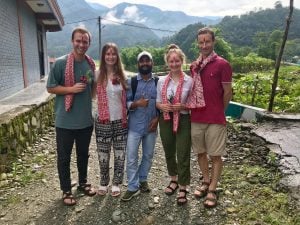Embark on a journey through Barcelona's captivating art and architecture. Explore the visionary works of Gaudí, Picasso, and more, set against the city's stunning landscapes.
GVI
Posted: July 5, 2024

Posted: November 5, 2019
On the surface there is no method to the madness. In the busy streets, it is not uncommon to see scooters, dogs, cows, cars, tractors, and trucks all converging on an intersection with no stop sign or stoplight. In addition, the myriad of things in the road are likely going the wrong direction. To pass someone on the road, you simply honk your horn and drive into oncoming traffic, often causing other cars to stop driving completely. Despite the irregular and often terrifying roads, not to mention the lack of paved roads, I have only seen one wreck in 1 month. Although it does not seem to make sense to me, the Nepali drivers navigate the roads with ease. To me, this highlights their easy-going nature, and care for others, as they happily give way to other drivers, animals, and pedestrians.
More importantly however, they are also one of the many things that I have come to appreciate about the Nepali culture and people as it highlights their non-Western outlook. They do not seek efficiency and profit as their highest goals. Although neither of these are inherently wrong in Western culture, the absence of these goals allows for the flourishing of other beautiful characteristics. The beautiful parts of the culture I am referring to include hospitality, contentment with small amounts of material goods, the importance of family, neighbors who really know and care for each other, physical touch among friends in public, and much more.
Before, I would have looked at the small houses and meager living situations and felt pity. Yes, there is abject poverty, and when basic needs are not being met one should feel badly and move to help their fellow human being. However, when I now see poorer living conditions, I see how thankful these people are for what they DO have, rather than focusing on what they don’t. This understanding of how different cultures work is vital to doing sustainable and effective work in another country.
To me, this highlights how Western remedies are not always the best solutions in developing countries. I have learned much about sustainable development from being in Nepal, and have much to learn. I try to appreciate more and pity less. There are things that challenge me, things that cause me to rethink, and ultimately I don’t like everything I encounter. But the point isn’t liking things. The point is to foster external dialogue and internal reflection based on the different cultures and peoples with whom I interact daily as a result of volunteering in Nepal.

Embark on a journey through Barcelona's captivating art and architecture. Explore the visionary works of Gaudí, Picasso, and more, set against the city's stunning landscapes.
GVI
Posted: July 5, 2024